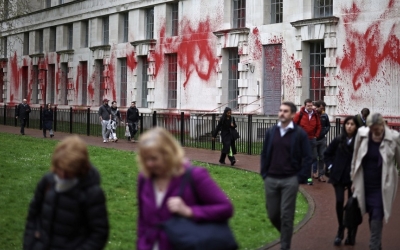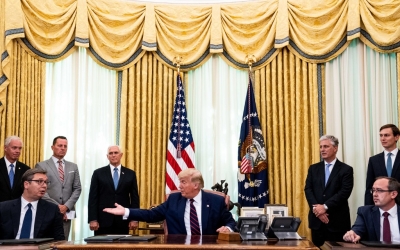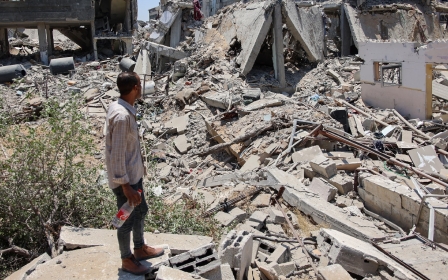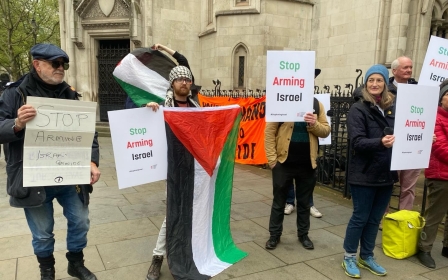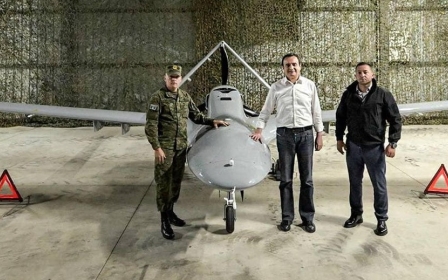War on Gaza: Serbia's arms sales to Israel put the country's political ties in the spotlight
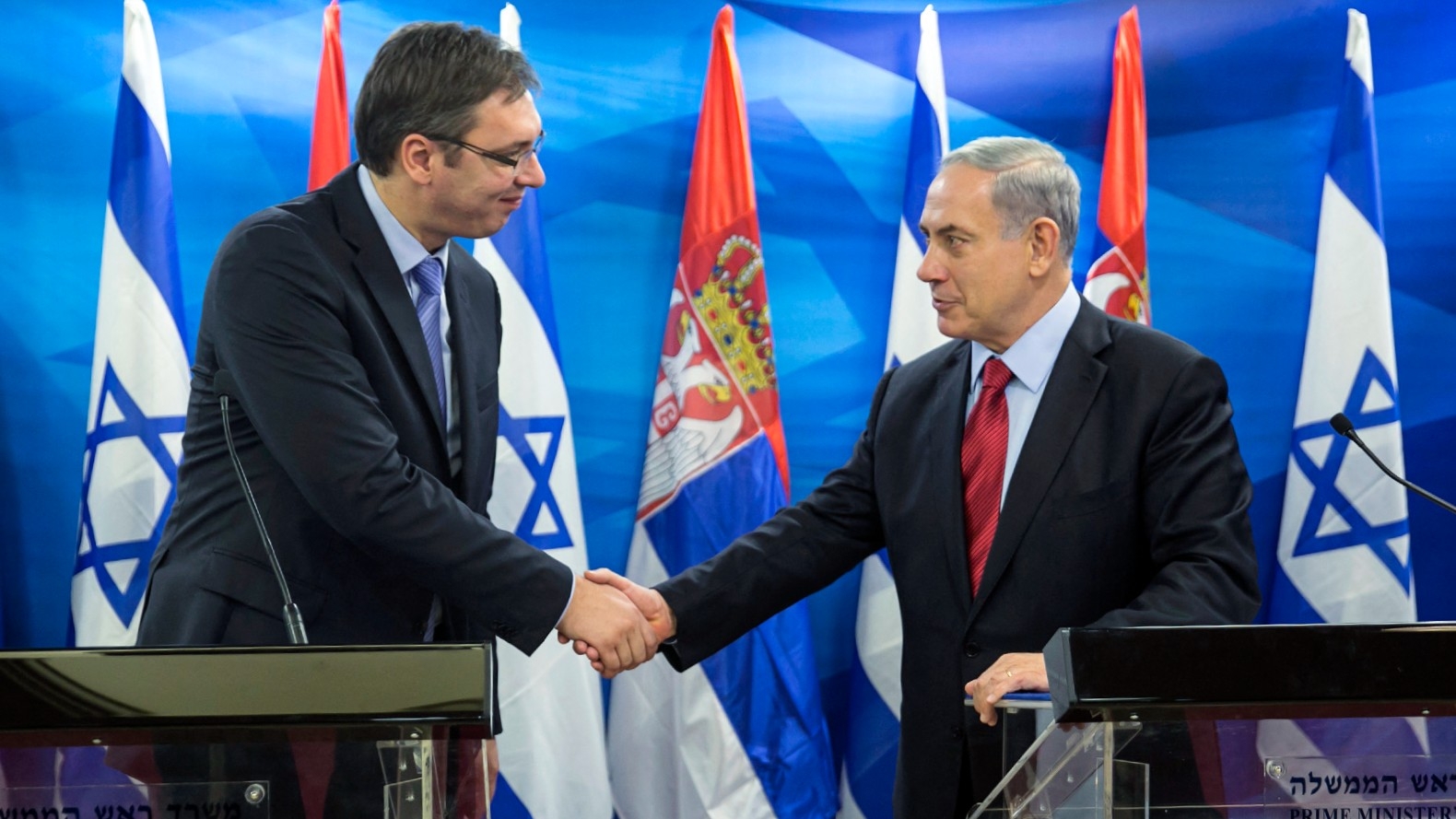
When Serbian President Aleksandar Vucic spoke at a pro-Israel lobbying event in Washington four years ago, he proudly declared that Belgrade's support for Israel was ironclad and could be traced back three decades before Israel's establishment in 1948.
He claimed that in 1917, the Serbian representative in Washington, Milenko Vesnic, supported the establishment of a state named Israel following the signing of the Balfour Declaration, a document less than 70 words long that affirmed Britain's support for a Jewish homeland.
"There are many things you can define as a common denominator between Serbs and Jews," Vucic told the American-Israel Public Relations Committee (Aipac), long known as one of the most powerful special interest groups in Washington.
"We suffered the same terrible destiny in World War II in the concentration camp[s]," Vucic said. "We love [the] Jewish people, we have always had great relationships," he added.
Vucic's sit-down with Aipac came at a time when former foes Serbia and Kosovo were hashing out a plan to normalise economic relations as part of a deal brokered by the Trump administration.
New MEE newsletter: Jerusalem Dispatch
Sign up to get the latest insights and analysis on Israel-Palestine, alongside Turkey Unpacked and other MEE newsletters
Even though Vucic and prominent Serbian officials had refused to recognise the independence of Kosovo, Vucic was convinced by the perks of agreeing to the US-brokered economic deal.
It was widely seen that the economic agreement would see the US open a Development Finance Corporation office in Belgrade, and there could be broader signals to investors and credit agencies that Serbia was open for business.
However, following the agreement, which was signed later in 2020, Kosovo was recognised as an independent state by Israel and in response opened its embassy in Jerusalem - becoming the first Muslim-majority country to recognise Jerusalem as the capital of Israel.
Serbian officials, including Vucic, were outraged by Israel's recognition of Kosovo, and Serbia, albeit quietly, downgraded its level of representation in Israel.
'For Serbian policymakers, Israel is seen as a gateway to the US'
- Maja Bjelos, Belgrade Centre for Security Policy
Whilst the political relationship seemed tense on the surface, ties, especially in the realm of defence, however, continued.
The Israeli newspaper Haaretz and Balkan Insight recently revealed that Belgrade was still exporting large volumes of weapons and ammunition to Israel, and ramped up exports this year amid the current war on Gaza.
Both publications reported that Serbia exported at least €16.3m ($17.1m) worth of weapons to Israel through Israeli military planes as well as some civilian aircraft using Greek airspace, possibly also carrying crucial 155mm artillery rounds, produced by the Serbian state company Krusik.
One source familiar with Israel's relationship with Serbia said that the weapons exports weren't surprising.
"Israel had been lobbying the Vucic administration for years," the source told Middle East Eye.
Interests align
Serbia boasts the largest defense industry in the western Balkans and military exports in 2021 were valued at around $1.2bn.
Belgrade is also known to export to other countries across the Middle East, with reports in 2018 indicating a significant resurgence in sales to the UAE. According to previous investigations by MEE, the UAE agreed lucrative deals to develop the Serbian arms industry.
In 2020, in an interview with the Jerusalem Post, Vucic said that he had intended to make major arms purchases from Israel, adding that no one in in Serbia had heard of the Boycott, Divestment, and Sanctions movement, more commonly known as BDS.
"Serbia will always do our best to align our interests with Israel," he said.
The following year he opened an official Serbian government agency branch, the Serbian Chamber of Commerce in Jerusalem.
Maja Bjelos, a senior researcher at Belgrade Centre for Security Policy, said Vucic's pragmatic and opportunist foreign policy included arms sales to Israel and Ukraine.
"For Serbian policymakers, Israel is seen as a gateway to the US administration and improving bilateral relations with the US," she told MEE.
One curious dimension of Vucic's relationship with Israel is his own election campaigns.
Asaf Eisin, an Israeli political consultant, has been advising the Serbian president since 2004 when he ran the campaign for mayor of Belgrade, which Vucic then lost by only 4,000 votes.
"Eisin has been my friend for almost a decade. He helped me then, he helps us now and he will always help us," Vucic once said, according to the Serbian media outlet Nova.
The outlet reported that Eisin worked on the presidential campaign for Vucic in 2017 together with another Israeli political consultant, Aron Saviv, who owns the company Saviv Strategies and Campaigns.
On his official website, Saviv said in 2017 he "helped Vucic win the presidential elections in Serbia".
And then there's another connection: Shaviv served as campaign manager of Israeli Prime Minister Benjamin Netanyahu’s election campaign in 2015.
Meanwhile, Eisin advised Israeli President Isaac Herzog's parliamentary election campaign the same year.
A regional diplomat said that the notion Vucic was selling weapons to Israel due to political considerations was farfetched.
"Belgrade is totally bankrupt and they are selling weapons to anyone they could," he told MEE, speaking on condition of anonymity.
Geared towards another Trump term
Nikola Lunic, the Executive Director at the Council for Strategic Policy in Belgrade, also downplayed the importance of Vucic’s campaign ties to Israel, telling MEE that Israel and Serbia don’t enjoy a high level of ties due to the dispute regarding the unilateral recognition of Kosovo by Israel.
"[Israelis advising Vucic] are professionals working for the election campaigns, not sure it is involving any political devotion or foreign policy goal," he said.
However, earlier this year, when weapons shipments were sent from Belgrade to Israel on 26 February, Vucic spoke by phone with Netanyahu, who described the Serbian president as "a true friend".
"I expressed my gratitude for his unwavering support, both in word and deed," Netanyahu said on the social media platform X, formerly known as Twitter.
If Trump wins the US presidential election in November, Serbia's ties with Israel could strengthen
- Maja Bjelos, Belgrade Centre for Security Policy
"Through these sales and ties with Israeli politicians and lobbyists, the Serbian president aims to establish himself as an essential partner of the West in the Balkans and gain more influence with western decision-makers, particularly those in the United States," Bjelos said.
Lunic, also a former Serbian military officer, said like Serbia's indirect ammunition sales to Ukraine, weapons to Israel were most likely transferred through third parties.
"Without any doubt, Belgrade possesses end-user certificates and we don’t take any responsibility for their further use," Lunic said.
"Some foreign companies may buy those weapons, we cannot know which country they re-export them beyond the end user certificates we have, whether it includes Israel or not."
Lunic added that weapons sales to Ukraine had been done similarly, through companies that weren’t directly connected to Ukraine.
Then there are the political considerations, which analysts say are more important for Vucic than weapons sales.
The Serbian leader frequently says how the grandparents of Thedor Herzl, the founder of Zionism, were born in Belgrade and still rest in the city's Jewish cemetery, and that his country was the first to pass a Holocaust Property Restitution bill, which allowed the government to pay 30m Euros to Jewish municipalities for the properties without any living heirs.
Analysts say that Vucic also knows how to use global developments to his advantage as well.
"Israel did not vote for the UN General Assembly resolution on the Srebrenica genocide, while Serbia, in turn, did not join state parties to the Rome Statute statement in support of the International Criminal Court as an independent and impartial institution," Bjelos said.
Bjelos said that Vucic likely expects Trump to win a second term, and is intent on currying favour with him should he win reelection and return to the White House.
"If Trump wins the US presidential election in November, Serbia's ties with Israel could strengthen, which would further strengthen ties among the global populist right," Bjelos added.
Middle East Eye delivers independent and unrivalled coverage and analysis of the Middle East, North Africa and beyond. To learn more about republishing this content and the associated fees, please fill out this form. More about MEE can be found here.


